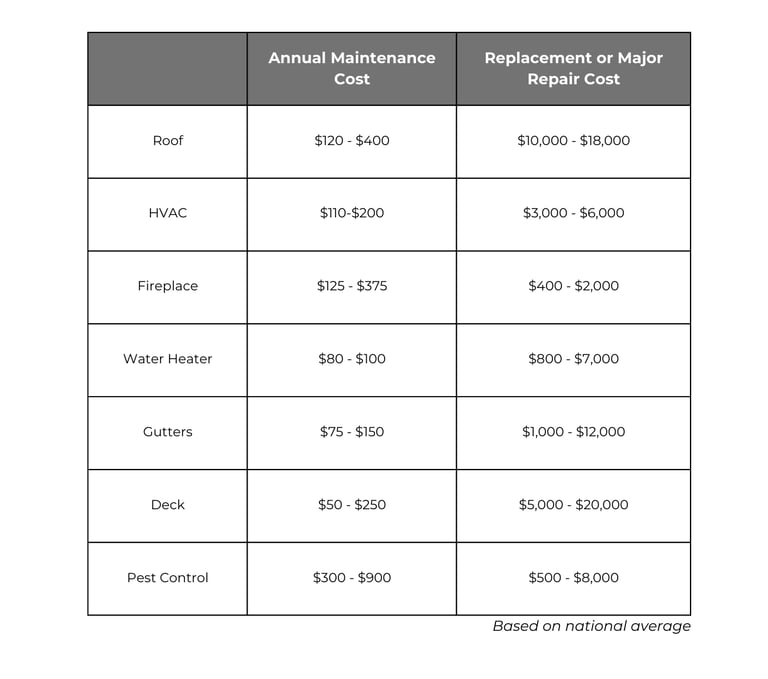Home Maintenance Budgeting
FAQSFEATURED


"With the right budget in place, you can avoid surprise expenses and keep your house in great shape for years to come."
How Much Should You Budget for Home Maintenance?
Not every homeowner handles maintenance the same way. Some stay ahead of problems and spend a little each month, while others ignore issues until they’re writing a check with way too many zeros.
The reality? Your home is going to cost you money over time. But if you plan for it, you’ll save yourself from those expensive “surprises” that could’ve been avoided with basic upkeep.
And of course, not every year will be the same. Some years you’ll barely touch your maintenance budget; other years, you’ll be replacing a water heater or patching a roof. The key is having the funds ready when those big-ticket repairs hit.
Why a Maintenance Budget Matters
Skipping maintenance isn’t saving money—it’s setting yourself up for a major financial headache. Keeping up with regular maintenance means:
✅ Fewer unexpected breakdowns
✅ Lower repair and replacement costs
✅ A higher home value when it’s time to sell
If you’ve got money set aside, you won’t be scrambling when the AC dies in the middle of summer or when a leaking pipe threatens to flood your basement.
What’s Included in Home Maintenance Costs?
Your home will need regular maintenance, whether you like it or not. Some repairs you can plan for, while others sneak up on you. Here are some common costs:
Lawn care & landscaping – Mowing, trimming, reseeding, fertilizing
Plumbing – Leaks, clogs, water heater repairs
Electrical & wiring – Outlets, light fixtures, circuit breakers
Roofing – Replacing shingles, patching leaks
Exterior upkeep – Painting, power washing, sealing cracks
HVAC maintenance – Cleaning vents, changing filters, servicing units
General wear & tear – Ceiling fans, flooring, doors, and windows
Pest control – Ceiling fans, flooring, doors, and windows
Even if nothing big breaks, all these little things add up over time.
What Affects Your Home Maintenance Costs?
Not all homes are created equal when it comes to upkeep. A few factors will dictate how much you need to budget:
Your Home’s Age
Older homes = more maintenance. Period. If your house is 30+ years old, expect to spend more keeping it in shape.
Your Home’s Condition
A well-maintained home will cost less to upkeep than one that’s been neglected. Stay on top of repairs, and you’ll keep costs more predictable.
Your Home’s Location
Where you live plays a big role in how much maintenance your home will need.
Harsh winters = More snow removal, ice damage, frozen pipes
Humid climates = Higher risk of mold, mildew, and wood rot
Storm-prone areas = Potential roof, siding, and window damage
If your area gets hit with extreme weather, you’ll need to budget accordingly.
Home Maintenance vs. Replacement Costs
Want to know how much maintenance saves you? Here’s what regular upkeep costs vs. full replacement:


Skipping maintenance can turn a minor cost into a major expense.
Three Easy Ways to Budget for Home Maintenance
1. The 1% Rule
Set aside 1% of your home’s value per year for maintenance. If your home is worth $300,000, that’s $3,000 annually, or $250 per month. Simple.
2. The Square Foot Rule
Budget $1 per square foot of livable space per year. Got a 1,800 sq. ft. home? That’s $1,800 per year, or $150 per month.
3. The 10% Rule
Save 10% of your monthly housing costs (mortgage, property taxes, insurance) for maintenance.
Example:
Mortgage: $2,000
Property taxes: $400
Insurance: $220
10% of that total ($2,620) = $262 per month into your maintenance fund.
Bottom Line
Home maintenance really should not be optional, it’s the cost of homeownership. But with the right budget in place, you can avoid surprise expenses and keep your house in great shape for years to come.
Plan ahead, set aside cash, and take care of small issues before they turn into big ones. Your future self (and your wallet) will thank you.
Check out these articles to learn more about monthly maintenance:
